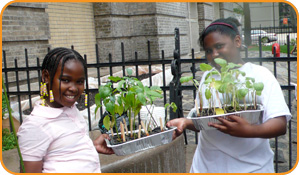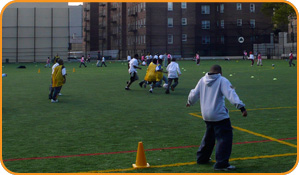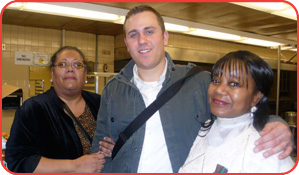
Last June, fourth graders at an elementary school in Crown Heights, Brooklyn, planted their first garden,
the seeds of a project all hope will transform their neighborhood from dilapidated and gray to healthy
and green.
All summer, their teacher, Ms. Natasha Rodriguez, watered. And this fall, her new fourth graders harvested tomatoes, peppers, collards and more. They named this nascent initiative in one of the city’s poorest neighborhoods, Seeds in the Middle. They decided it was Hip2B Healthy. They are shining the beacon for others to emulate.
PS 91’s home is central Brooklyn, among the New York City neighborhoods with the highest rates of obesity, heart disease, asthma and diabetes. A large percentage of P.S. 91’s nearly 800 children are overweight, many parents are diabetics and 97% of the students are eligible for free lunch. Former President Clinton, First Lady Michelle Obama and other leaders have cited alarming reports of how escalating obesity rates are particularly plaguing minority Americans, driving down academic performance and opportunity and escalating health care costs. “The physical and emotional health of an entire generation and the economic health and security of our nation is at stake," said Ms. Obama on Feb. 9th, 2010.
Seeds in the Middle evolved from an 11-year friendship between an investigative journalist and a Crown Heights principal who dedicated three decades of his life to nurturing, protecting and educating some of the city’s most disadvantaged children. In a front-page expose in 1998 in the Daily News called “Halls of Shame,” reporter Nancie Katz detailed Principal Solomon Long’s eight-year battle to get city officials to repair his school, a neglected building where children learned from damp books as plaster fell on their heads, teachers used easels to cover holes in the floor, wind whistled through holes in the wall, vermin scampered. Within a week of the story, millions of dollars were dedicated toward the repairs.
Thus began a relationship that expanded last spring when Ms. Katz approached Mr. Long to ask if she could help get programs for his school that other wealthier neighborhoods with active parent associations took
for granted.

|
|
First came music and sports – a soccer program made possible by volunteer coaches from Manhattan. Children sang, a neglected piano sounded through the hallways for the first time in 20 years! At a field across the street, students ran, kicked balls, shouted, cheered, jumped for joy. Parents beamed.
Then, with faculty, our team took a closer look at the ill health of the community. P.S. 91 took action.
With donations from the NYC Parks Department and Lowe's, we built planting beds. Children began growing eggplant, collard greens, tomatoes and more. But we soon realized that planting a garden is not enough to help a community overcome unhealthy eating habits.
Our challenge? How does a school create a sustainable nutritional life-changing program that can be embraced by a community with limited access to affordable fresh produce, quality supermarkets, healthy cooking, exercise, after-school programs or quality health care?
Our answer: More teacher support in the classroom, cooking classes, a school-run market, professional development and physical fitness integrated into the school day and community.
For months, Mr. Long, Ms. Katz and Assistant Principal Linda Barnette worked to create a integrated program that could be replicated in other schools where principals and staff are too busy to seek out resources needed for sustainable change. Ms Katz used her best investigative reporting skills to identify quality resources and then weave them together into an easy-to-implement educational package for schools. We listened to faculty, parents, students and the community, engaging them in positive, respectful ways to reach for what they need for better health and quality of life.
And we borrowed strategies from the Clinton Global Initiative and global anti-poverty programs that work: partnering business, government and non-profit entities to develop and implement effective change.
We have been thrilled by the response. Whole Foods Market stepped up first for our Hip2B Healthy Market. Children now can buy nutritional snacks for as little as a quarter so they don’t purchase junk food at the bodega. Cornell and New York University professors and experts volunteered to work with students and faculty to create a sustainable, integrated curriculum that boosts math, literacy, social science and science skills. Home Depot custom-built 44 planting tables for every classroom so every child gets a chance to grow and understand where food comes from. The Parks Department, Home Depot and others support the edible garden. Expert chefs conduct cooking workshops with fresh foods during the school day for children and evenings for parents and children. Professional coaches have developed our first-ever soccer league, and we just started track. Bike New York is sponsoring our children May 2 in the five-borough bike tour. Dance programs and other sports get every child and adult to move! A new Greenmarket Youthmarket will pay youth to sell fresh produce this spring. Children and adults travel to green markets, urban farms. School chefs are being inspired by experts to prepare tasty, nutritious breakfasts and lunches. Music, dance and arts programs are exciting children’s learning. |
|

We are grateful to many volunteers from all walks of life who are devoting their time and talents to enable the larger village of New York to grow and prosper. We depend on them, as we build funding.
What is exciting is that we have the principals’ support and dedicated, lovely teachers and parents who want to grow gardens and are creatively integrating their curriculum to meet state learning standards. Every day, we draw in more community and sponsors through parent outreach and the HIP2B Healthy Market. The students are planting seeds in the middle of Brooklyn to inspire and empower their neighborhood to
get healthy.
Seeds in the Middle is a registered 501c3 charity
Seeds in the Middle:
Nancie L. Katz, Executive Director
Solomon Long, Director of Education
Joseph Cabral, Director of Soccer/Lead Coach
Errol Rose, Director of Sports/Community Outreach
Clara Kirkland, Principal, Public School 221, pilot Hip2B Healthy School
Richard J. Gordon, MD, FACC, Medical and Scientific Advisor
Brooklyn Crown Eagles:
Joseph Cabral, Director of Soccer/Lead Coach
Errol Rose, Community Outreach Coordinator, Chair - Soccer for Harmony
Zoe Schweitzer, Volunteer Coordinator
Rachel Bogin, Volunteer Soccer Coach
Mordechai Roth, Co-Director, Community Outreach
|